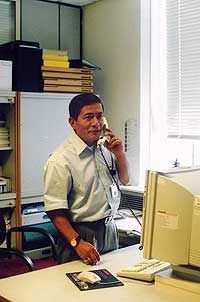 During the darkest days of the insurgency, most Nepalis-including the Maoists themselves-who wanted real news tuned in to the BBC Nepali Service.
During the darkest days of the insurgency, most Nepalis-including the Maoists themselves-who wanted real news tuned in to the BBC Nepali Service.
Ever since it was started, the nightly new bulletin in Nepali has been the most reliable source of information for Nepalis on what is happening in Nepal itself. During the Panchayat years, the BBC's Hindi news bulletins used to be staple fare for most Nepalis.
Such was the demand for trustworthy news that what began as a half-hour weekly bulletin addressing topical issues is now a daily source of news and information for Nepalis all over the world. And as the Nepali diaspora grows, so does the listenership of this shortwave broadcast which is now estimated at 1.5 million. What shortwave reception lacks in sound quality, it more than makes up for with relevance. For Nepalis in the Gulf, Malaysia or Japan, it is the only source of news from home. Now, the BBC Nepali Service is also available on bbc.co.uk/nepali and nepalnews.com in audio.
"The main advantage of using short wave is it reaches far flung areas where medium wave and FM don't reach," says Khagendra Nepali (pic, bottom right), the editor at the BBC Nepali Service in London. Shortwave is still the most affordable and accessible medium to reach Nepalis in Nepal and abroad. But the service is rebroadcast simultaneously on FM in Kathmandu on Radio Sagarmatha 102.4 FM and in Burnei and through the British Forces Broadcasting Service for the 3,000 or so Gurkha unit and families there.
In their tiny workspace at Bush House that sits cheek-by-jowl with BBC's Bengali, Tamil, Urdu and Sinhala sections, the Nepali crew was getting busy this week for the evening bulletin. Veteran broadcaster Mani Rana was bidding goodbye after 32 years in the service, saying he loved every minute of his time in the service. "When I came to London, my English was better than my Nepali, now it's the other way around thanks to the BBC Nepali Service," he tells Khagendra Nepali during a goodbye interview inside the studio. Fulltime staff strength is being augmented to four by the arrival here this week of Bhagirath Yogi from the Nepali Times.
"This is really exciting work, you know you are providing a service with impartial and factual information," says reporter and announcer, Jitendra Raut (right in pic, top).  The production teams here are supported by BBC producers and correspondents the world over, especially in the coverage of the Iraq war. In addition, the Nepali service does its own interviews with Nepalis in Kuwait and the Gulf region. The news team also has stringers in Kathmandu and all over Nepal who have been kept busy in the past three years covering news of violence. But since the ceasefire, there is daily coverage of the peace process and interviews with senior political figures.
The production teams here are supported by BBC producers and correspondents the world over, especially in the coverage of the Iraq war. In addition, the Nepali service does its own interviews with Nepalis in Kuwait and the Gulf region. The news team also has stringers in Kathmandu and all over Nepal who have been kept busy in the past three years covering news of violence. But since the ceasefire, there is daily coverage of the peace process and interviews with senior political figures.
Research and collection of materials are currently under way for a series on HIV/AIDS in Nepal. In a similar series last year the crew tackled issues of good governance. Nepali artists traveling through London are interviewed and weekly segments are devoted to national sports news, science and technology, current affairs and correspondence from Nepalis as far afield as Guam and Angola. The team says that feedback keeps them responsible and vigil. "We have very responsive listeners, and now they let us know their opinions almost instantly through email," says Raut.
The BBC Nepali service has been almost axed several times, but has always managed to survive budget cuts. Any new plans for expanding the service? "Nothing really on the horizon, the BBC has limited resources and so we must prioritise. Unless it is very big news and people are crying out for more information-like after the royal massacre-we stick with regular programming," says Khagendra Nepali.
(BBC Nepali Sewa airs daily 2045-2115 and 2245-2300 Nepali time on Radio Sagarmatha 102.4 FM in Kathmandu.)


